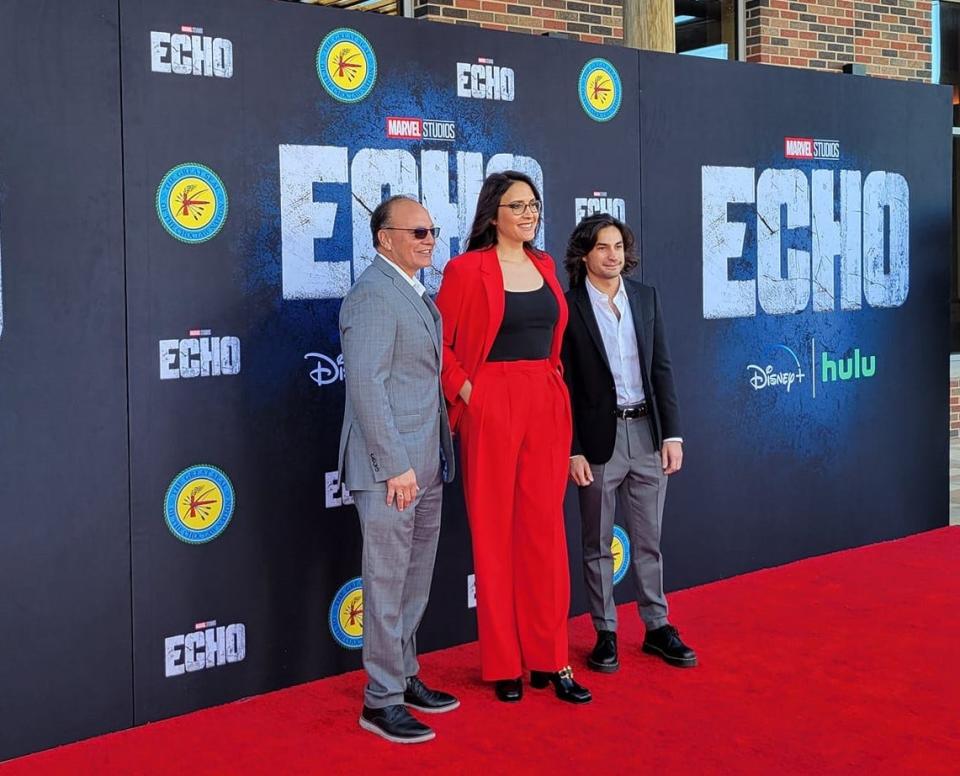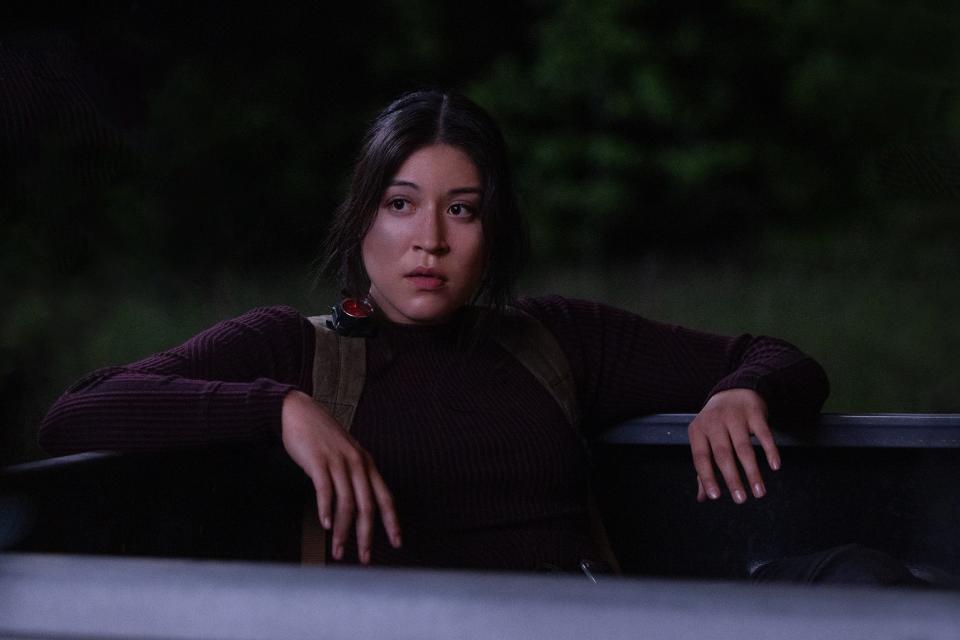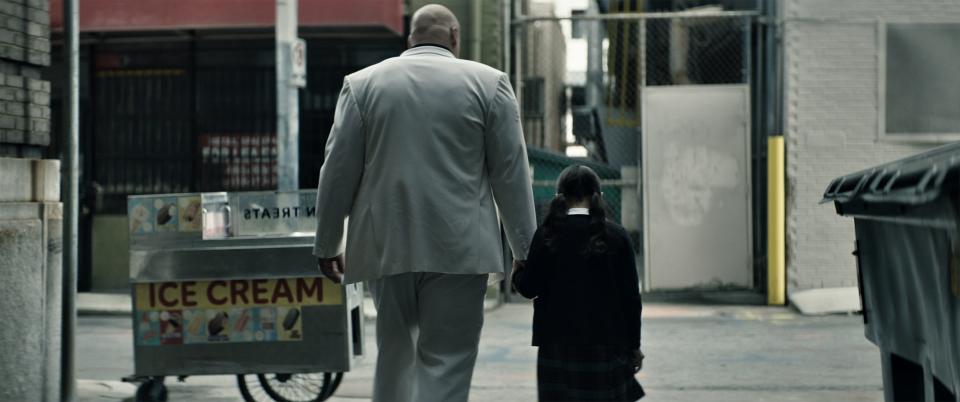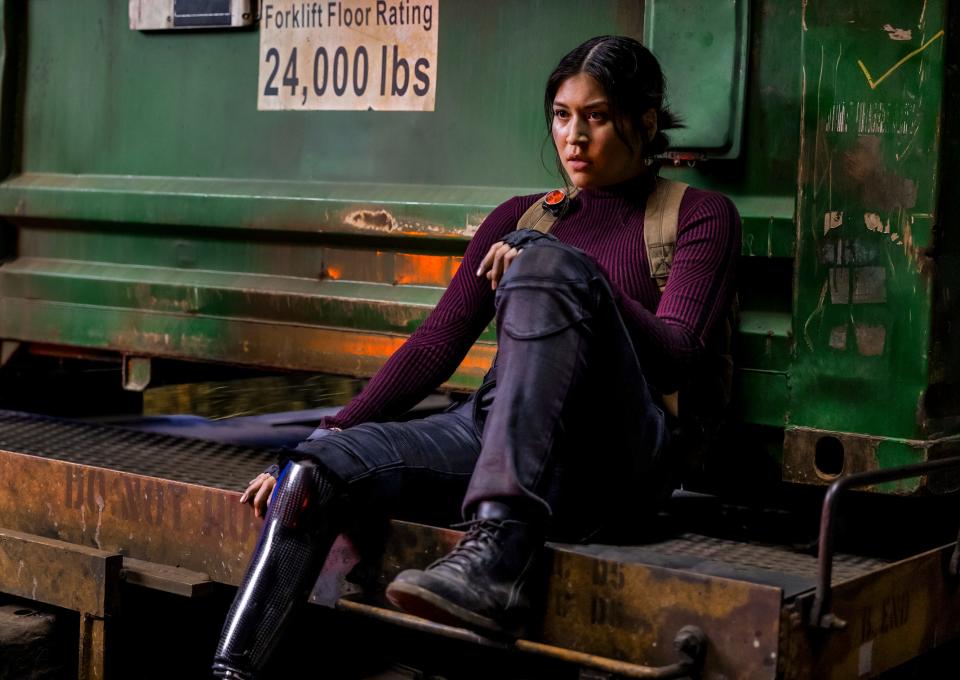Set in Tamaha, Oklahoma, Marvel's 'Echo' is 'a new phase' for Native storytelling
The entry point for the entertainment juggernaut’s first project focused on Native America wasn’t a cosmic portal or secret government lab. Instead, it was the Choctaw Cultural Center in Calera, near Durant.
“We came and presented … at the Choctaw (Cultural) Center, and really, for myself, it was two things: One was to ask permission from the Choctaw Nation to be portrayed, because I feel like a lot of times what happens with Native and Indigenous stories is that people come in and they say, ‘We're gonna tell you what story we're gonna tell.’ And we wanted to take a different approach,” said “Echo” director and executive producer Sydney Freeland in a recent virtual news conference attended by The Oklahoman.
“The second part was, ‘Can we create a dialogue?' … Every tribe is different, every language is different, every culture has its own unique specificities. I'm Navajo, and we're telling a Choctaw story. So, for me, it was an absolute necessity that we engage the Choctaw Nation to tell that story.”

All five episodes of the gritty streaming series, which is rated TV-MA for mature audiences, will be released on Disney+ and Hulu Jan. 9 (a day sooner than previously announced).
Hailed as a major moment for Native representation, the first two episodes of "Echo” reference the Choctaw origin story, showcase tribal traditions like stickball and include frequent use of the Choctaw language.
Walking the red carpet in a gray suit during a November “Echo” event at the cultural center, Choctaw Chief Gary Batton called the show “history in the making.”
“Used to, if I'm the chief — and I am — I’m supposed to be wearing a headdress and all those types of things. We’re able to show a modern-day tvshka, a warrior, of the Choctaw people,” he said.
“This is the first time that we've actually had Hollywood come to Durant, but also I love this story that shows the tribe, our resiliency, our strength as a people.”

How does ‘Echo’ bring a Marvel villain back to her Oklahoma and Choctaw roots?
In its 2021 "Hawkeye" Disney+ series, Marvel Studios introduced the Marvel Comics character of Maya Lopez, aka Echo, played by Native performer Alaqua Cox, who is Menominee and Mohican.
"Echo" is being hailed as a major moment for the disability community, too: Like the Marvel Comics character she plays, Cox is deaf. The actor also uses a prosthetic leg, which has been incorporated into the character.
“I am an amputee, so I went through many different surgeries as a child. So, that made me a warrior, in a sense. Maya, she had … all these tragic events that happened in her life,” Cox said during the virtual press conference. “We're both warriors, we're tough, and we're badass.”
Born into the Choctaw Nation in rural Oklahoma, Cox’s Maya follows in the footsteps of her father (Zahn McClarnon, the Oklahoma-made "Reservation Dogs," "Dark Winds"), becoming the fierce commander of the New York City criminal organization the Tracksuit Mafia.

Maya grows up with the fearsome crime lord Wilson Fisk, aka Kingpin (Vincent D'Onofrio), as her honorary uncle and boss. When they wind up at odds, Maya declares war on Kingpin’s empire and makes her stand in her small Oklahoma hometown, where she must confront her family and legacy.
“In ‘Hawkeye,’ she’s introduced as a villain … and the goal was never to try to turn her into Captain America,” Freeland said. “You look at, 'Oh, this is a deaf, Indigenous amputee girl from Oklahoma. How the hell does she end up being one of the top-ranking lieutenants in Kingpin's army?’ … You layer on the Choctaw cultural specifics on to that, it gave us a chance to tell a really fun story.”
In "Echo," D'Onofrio reprises the role he originated in the pre-Disney+ 2015-18 Netflix series Marvel's "Daredevil" and played again in "Hawkeye."
“It's a more emotional story with me and Alaqua's character … and the girl carried the show like a pro,” D’Onofrio said in the virtual presser. “I could’ve never expected to be in a show like ‘Echo’ … because of the whole ancestral part of this show that Maya’s character brings you to — or that her ancestors bring us to through Maya.”
Which Indigenous actors, directors and writers worked on ‘Echo?’
Along with McClarnon and Cox, “Echo” stars well-known Indigenous actors Graham Greene (“1883”), Tantoo Cardinal (“Killers of the Flower Moon"), Cody Lightning (“Four Sheets to the Wind”), Devery Jacobs (“Reservation Dogs”) and Tahlequah-born Chaske Spencer (“The English").
“I’m just so proud to be able to represent a platform that is uplifting voices for Indigenous people,” Cox told The Oklahoman during the virtual news conference. “It’s so great that we have authentic people being picked for these roles, and we’re able to show them on the screen in authentic representation — and we’re doing it the right way.”
Freeland split directing duties on "Echo" with another Indigenous director, Catriona McKenzie, who is Aboriginal Australian. Steven Paul Judd, a Lawton native, artist and filmmaker who is Kiowa and Choctaw, is among the series’ writers.
“It wasn't that long ago when I was a struggling actor in New York City, it was hard to land an Indigenous role that was written very well actually. I had to pay my dues, doing some roles that weren't all that great,” Spencer, who is Lakota Sioux, Cherokee and Muscogee, told The Oklahoman.
“I’ve always thought that the power is behind the camera, and the stories that the Indigenous writers write are more authentic. … There's still a long road to go, but, right now, it's a real phenomenal time for Indigenous film because there's a lot of talent out there.”

How does ‘Echo’ represent ‘a new phase’ in Native American storytelling?
A Critics Choice Awards nominee for her work on "Reservation Dogs," Jacobs, who is Mohawk, told The Oklahoman that Hollywood should follow the motto “nothing about us without us” when telling Indigenous stories.
“That's so true for any marginalized community … and I think when it comes to telling our stories, making sure that there are as many storytellers from that community as possible is paramount,” Jacobs said. “There's been 100 years of lack of representation and misrepresentation and intentional exclusion of Indigenous voices in Hollywood. So, I think to have us be a part of these conversations is integral to making sure that we're able to accurately tell our stories.”
Although "Echo," like most Marvel projects, was filmed primarily in Georgia, much of the action is set in Maya's rural Oklahoma community of Tamaha, which is based on a real eastern Oklahoma town formerly in the Choctaw Nation.
Before traveling to Atlanta, Jacobs said she toured the Choctaw Cultural Center, where one of the artworks became an inspiration for the relationship between her character, Bonnie, and Cox’s Maya.
“(It) was about these two cousins. … The relationship between Maya and Bonnie is, even though they're cousins, it's almost like they're sisters,” Jacobs said. “I remember texting the image to Alaqua and was like, ‘Oh my God, this feels like this is our characters.’”
During the November event for “Echo” at the Choctaw Cultural Center, Freeland told The Oklahoman she and other Native filmmakers like “Reservation Dogs” co-creator Sterlin Harjo just a few years ago were scraping by to make independent films.
“Native storytelling, it's definitely entering a new phase. … To be here with a show like ‘Echo’ that is a Marvel Studios production is extremely surreal,” said Freeland, who previously worked in Oklahoma on "Reservation Dogs.”
She contrasted the process of partnering with the Choctaw Nation on “Echo” to movies filmed in the past on the Navajo Reservation in New Mexico where she grew up, including a John Ford Western on which her grandpa was an extra.
“They used to shoot Westerns back home … and people would come and be, ‘Ah, the Indians, come and say some stuff in your language, OK? Yeah, I don’t know what you’re saying, but it sounds cool,’” Freeland recalled during the November Choctaw Nation event.
"One of the things that I remember talking about when I first got here was saying, 'We're not here to tell you what we're going to do. We're here to create a dialogue, specifically because we want your input … before we’ve shot anything, before we’ve prepped anything.’ So, if this feels authentic, if it looks true-to-life, that’s because of the engagement with our wonderful partners here.”
MARVEL STUDIOS’ ‘ECHO’
All five episodes of the Marvel Studios series “Echo,” which is rated TV-MA for mature audiences, will be released on Disney+ and Hulu Jan. 9 (a day sooner than previously announced). To stream on Disney+, subscribers should set their profile to TV-MA.
Hailed as a major moment for Native American representation, the first two episodes of "Echo” reference the Choctaw origin story, showcase tribal traditions like stickball and include frequent use of the Choctaw language.
This article originally appeared on Oklahoman: MCU's 'Echo' set in Tamaha Oklahoma a new phase of Native storytelling
